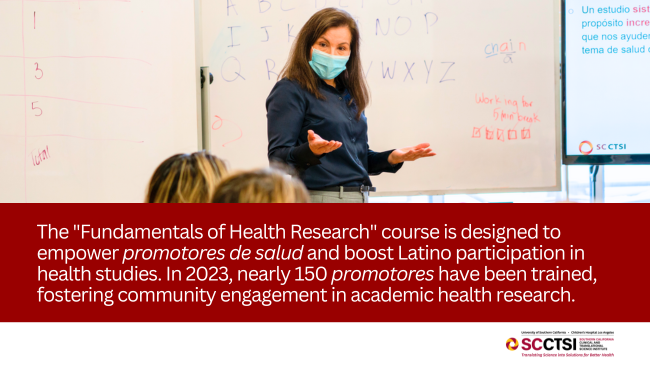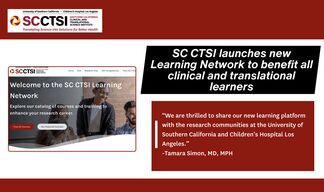SC CTSI’s Community Engagement Core advances research education for promotores de salud through innovative health research training
Growing numbers of Los Angeles promotores de salud—Spanish-speaking community health workers—are gaining invaluable professional education in research methods and protections that could open the door to more Latino participation in academic health studies.
The Southern California Clinical and Translational Science Institute (SC CTSI) Community Engagement Core and partners created and implemented the 12-hour “Fundamentals of Health Research,” a train-the-trainer course for promotores. This training provides a clear, culturally relevant guide into health research, exploring reasons why more Latinos could benefit by partnering in studies that evaluate new therapies and other interventions. In 2023, the program has trained almost 150 promotores, who are educating their communities about health research.
The course advances potential opportunities for promotores who might work at the Discovery and Translational Hub on the USC Health Science Campus, now in planning stages to bridge science, community, and healthcare.

Promotores are critical public health educators who have the trust of their communities.
“If community members have questions about their health, they seek out promotores and ask them for information or guidance,” said Mayra Rubio-Diaz, Special Projects Manager for SC CTSI Community Engagement Core.
A disproportionate number of Whites participate in health studies, more than any other racial or ethnic group. Health researchers need more collaborations with people of different genders, ages, races, and ethnicities to understand their most pressing health concerns, develop personalized medical treatments, and correct disparities in health care.
Latinos and other minority groups historically have had low participation partly because of an understandable legacy of distrust.
“Our training covers some of the history of health research in minority communities and why there has been mistrust,” said Nicole Wolfe, PhD, Associate Director of the Community Engagement Core at the SC CTSI. “It also highlights changes in human-subject protections, and promotores learn about participant’s rights and consent in research.”
The training begins with an overview of health research impacts.
“We show that scientific research provides the medicine and new inventions that benefit our health,” said Alma Garcia, Community Outreach Coordinator with SC CTSI. “Without research studies we would not have all of these advances to help us live longer.”
The training addresses some common misconceptions and fears about health research.
“If you are part of a clinical study, and you’re not sure if you want to stay, you can withdraw, and no one will hold that against you,” Garcia said. “With that understanding, they do feel more comfortable. They also like learning that when they participate in a study, there are ways for them to see the results. Then they say, ‘okay, maybe whenever I have the opportunity, I can participate.’”
Upon completing the course, many promotores express eagerness to continue learning about health research.
“They want to educate others about what they learned through us,” said Sara Calderon, Community Outreach Coordinator for SC CTSI Community Engagement Core. “We provide them with the materials and resources to continue their education.” Promotores are followed up quarterly for a year following completion of the training to understand the impact of this training on their work.
The intended outcome of this training is that it positively impacts the promotores professionally and opens additional pathways for them including potential job opportunities in the planned Discovery and Translational Hub. This seven-story, 700,000-square-foot building to be located on the Health Sciences campus will be a space for interdisciplinary innovation of novel medical approaches to advance treatment for a range of diseases.
The first floor of the building will be a gateway for community members to participate in clinical trials. The upper floors will facilitate collaboration among basic and clinical scientists who will explore advanced technologies in health research such as regenerative medicine, synthetic biology, and wearable devices.
“You’ve got to bring basic scientists together with clinical researchers and with the community, developing the solutions so that we can improve health and eliminate the leading causes of death and debilitating diseases,” said Michele Kipke, PhD, Co-Director of SC CTSI and Director of the Community Engagement core.



